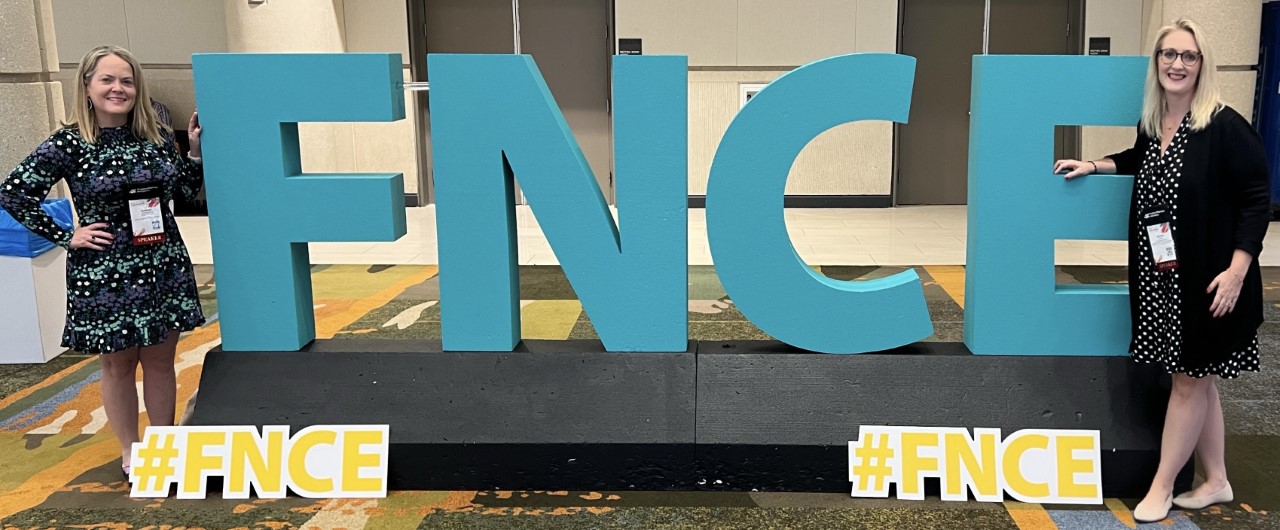 Dr. Marissa Barrera, right, director of the M.S. in Speech-Language Pathology, gave a talk on swallowing disorders for 400 registered dietitians and nutritionists at the Food and Nutrition Conference & Expo (FNCE) in October. At left, Dr. Barbara O’Connor Wells of Nova Southeastern University.
Dr. Marissa Barrera, right, director of the M.S. in Speech-Language Pathology, gave a talk on swallowing disorders for 400 registered dietitians and nutritionists at the Food and Nutrition Conference & Expo (FNCE) in October. At left, Dr. Barbara O’Connor Wells of Nova Southeastern University.Dr. Marissa Barrera, director of the Katz School’s M.S. in Speech-Language Pathology, provided over 400 registered dietitians and nutritionists (RDN) expert training in how to screen for swallowing disorders—a condition known as dysphagia—during the Food and Nutrition Conference & Expo (FNCE) in October.
The screening process for swallowing difficulties has only recently become a formal part of an RDN’s professional responsibilities. “It was just essentially the changing of the scope of practice, their competency, which was the real impetus for this,” said Dr. Barrera, who is also the Katz School’s assistant dean of science and health and the owner of New York Neurogenic Speech-Language Pathology.
Difficulty or discomfort in swallowing can occur as a complication of a number of diseases, a neurological disorder, or as a result of injuries or birth defects. Each year, upwards of 600,000 people in United States diagnosed with dysphagia had had a stroke.
For most healthy people, swallowing is a simple process that requires no more thought or effort than deciding to do it. But, for some, severe swallowing difficulties impair the quality of life, causing depression and withdrawal in addition to serious malnutrition.
Though it proceeds automatically once it starts, swallowing is a highly complex process. If the nerve connections between your brain and throat malfunction, you may be unable to initiate a swallow. Or, if your palate is malformed, your tongue is partly paralyzed or your teeth are seriously misaligned, you may have difficulty preparing food for swallowing.
“Swallowing dysfunction is a complex, multidisciplinary disorder that includes the RDN as a key stakeholder in helping screen and identify patients who may have dysphagia,” said Dr. Barrera.
The American Speech-Language Hearing Association (ASHA) defines a screening for swallowing as a minimally invasive procedure that enables quick determination of the likelihood that dysphagia exists, and that the patient requires referral either for further swallowing assessment or nutritional or hydration support.
The primary purpose of a swallowing assessment is to identify the risks of choking and aspiration, when food or liquid enters the airway and lungs by accident, and to determine a timely and appropriate referral and nutritional care plan. For example, a screening for swallowing should be performed in the first 24 hours after stroke. Unscreened individuals are at greater risk for pneumonia.
Dr. Barrera was invited to speak at the FNCE conference, the world’s largest meeting of food, nutrition and dietetics experts, by Dr. Patricia Grace-Farfaglia, a clinical associate professor at Sacred Heart University. Both were joined in the presentation’s development by Dr. Grace-Farfaglia’s colleague Tina Miller, assistant director of the Human Clinical Nutrition master’s program at Sacred Heart, and Dr. Barbara O’Connor Wells, associate professor of speech-language pathology at Nova Southeastern University.
After their presentation drew wide praise, the team decided they would share it with other licensed professionals, large nursing homes, the FNCE’s annual dietetics research group meeting next October in Connecticut, and educators, including graduate students in speech-language pathology.
As a professional and educator who prizes inter-professional collaboration, the opportunity to interact with graduate students, said Dr. Barrera, is the “icing on the cake.” Jessie McCartney contributed to this article.
